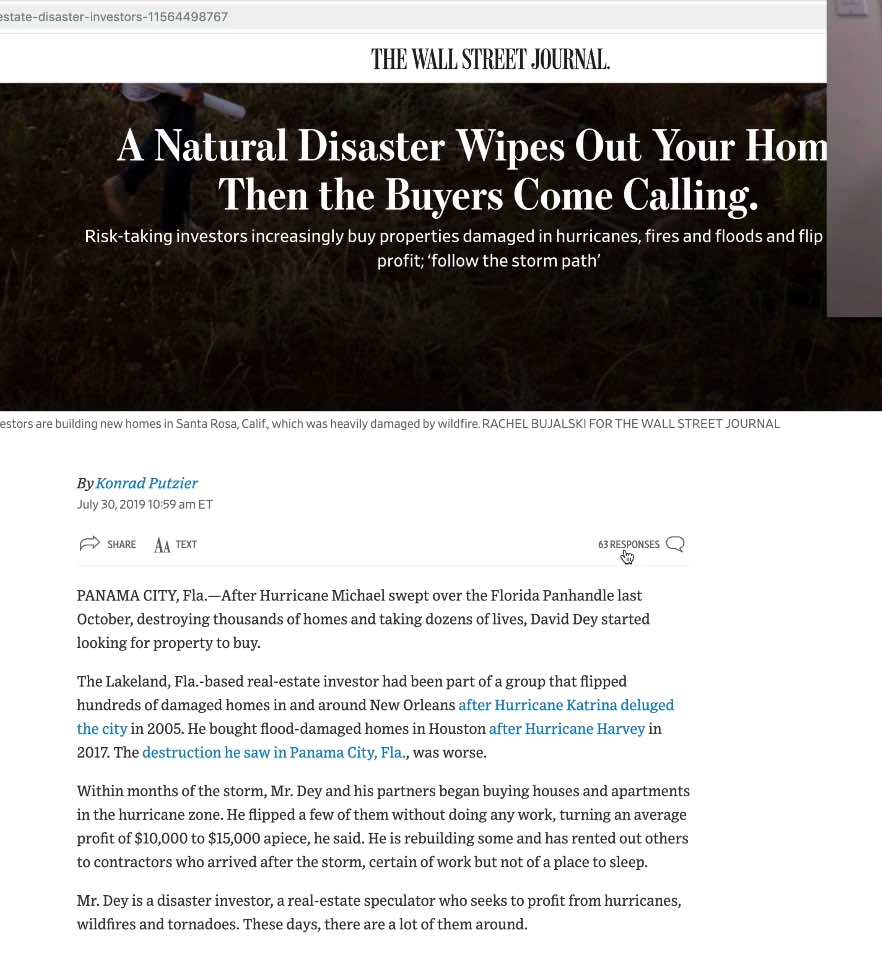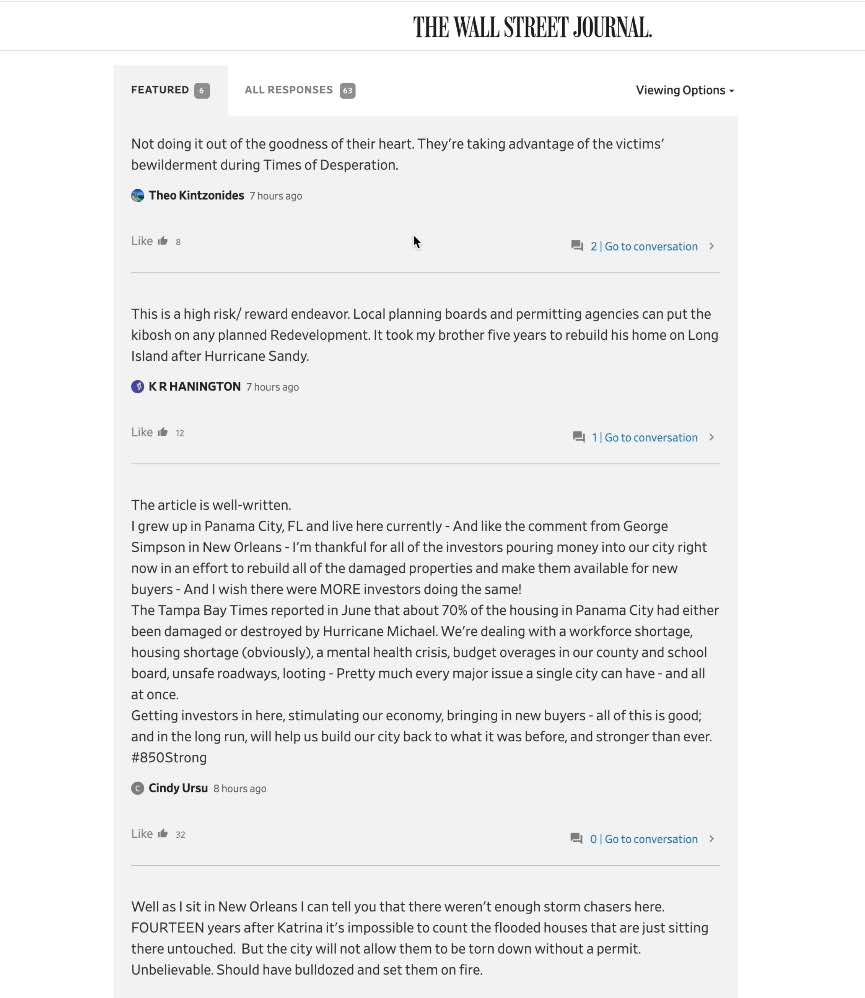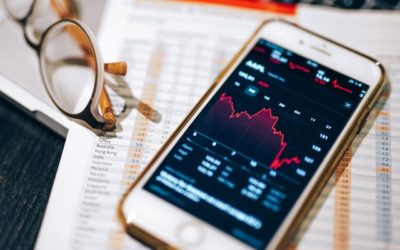Today’s episode is very different from anything that I’ve ever done before. I decided to do this because I want to hear your opinion regarding this article that I came across this morning on The Wall Street Journal. Basically, for those unfamiliar with the term ‘disaster investor,’ it’s a term used to refer to any investors who seek to profit from natural disasters in real estate investing.
In this context, in the real estate context, it refers to any real estate investor who is a chaser for natural disasters seeking cheap properties, either on bankruptcy. That way, they can actually come in and buy them at a very, very low price and then add them to their real estate portfolio. The reason why I wanted to bring this up today, aside from wanting to hear about your opinion, it’s because as an investor myself, this is something that I’ve never thought of.
During the financial crisis in 2008, a lot of investors expanded their real estate portfolio, buying any properties that defaulted in the mortgages and stuff like that. Still, I never thought of investing in properties that were either caught on fire or flooded by natural disasters. That’s the term that I’m looking for, controversy. The comments defer from the other side of the spectrum. Some people were pro at the practice, and some were really against the practice. I’m going to go ahead and pull up the article and my screen so you can take a quick look at it.
A natural disaster wipes out your home, and then I’m just going to Wall Street Journal. I believe the journal allows new users to access one free article, but if you don’t have a subscription for whatever reason, you can either check out their free trial that lasts for two weeks. You can go to the public library and ask for a subscription to The Wall Street Journal.

You got the story of a town that was hit by floods. In this case, they used Panama City in Florida as an example because Panama City was hit by a hurricane back in October 2018. It’s a disaster. It’s sad. A lot of these homes are flooded, you get mold growing in. The story goes about a couple of investors who came into town, and they decided to purchase these homes at a discount. They will share something like, well, you have this one investor who came in into town, and he started contacting the homeowners and meet with them in their homes, even though there’s mold growing on the surface.
He would schedule the meetings with them and sit with them in their homes, and he would build a rapport by looking at the pictures on the wall, asking these homeowners about their family members. Eventually, an emotional connection is built-in, and he goes in and swooping the offer and has the contract handy. Typically, as you might expect, the prices that are being offered to those homeowners are very, very low. These investors are using the argument that they are actually in a town devastated by a natural disaster. They are taking a risk to transform the community into something that hopefully, in the future, will be flourishing and the economy and stuff like that.
Ads
They come in, and they bring in the funds. They’re taking a financial risk to make things work. They are creating jobs for people who have probably lost their jobs because of the floods, and they’re transforming the community rather than having that town with an economy that it’s tough to bring back up while they wait for the government’s funds to come in.
On the other side of the spectrum, you have the people who are completely opposed to that practice because they’re thinking that the investor is manipulating these homeowners’ emotional vulnerability and, therefore, taking advantage of them. Not just that, by buying the properties at such a low price, it’s an insult to the locals. In addition to that, they’re building bigger different homes and bringing in “a bunch of outsiders” who are transforming the neighborhood and getting rid of the character of the town itself. That’s in a nutshell what they talked about.
The article also discusses sharing lots and lots of stats, numbers of different sell prices, and how these investors managed to build a power team in these communities. So they were able to transform the town from a major disaster into something that was completely renovated and flourishing and a healthy economy. What’s interesting is, I don’t know what to think of it, because from one side, I understand the investors, but then on the other side, you can’t help but feel bad for the people who lost their homes and stuff like that. I went in. As you can see here, check on some of the responses.
This morning when I read this, there were only 33 responses. Again, as I said, this article is drawing a lot of controversies, a lot of attention. Let me see if we can take a look at some of this. Right from the get-go, you got a total of 63 responses, but then I think the journal likes to feature a couple of them. I’m not sure how they decide to feature which ones versus another. Maybe it’s one that drives the most controversy or has the most responses. For example, you can see this comment right here of someone who was criticizing it, “Not doing it out of the goodness of their heart, they are taking advantage of the victims’ bewilderment during times of desperation.”

Someone who comes in and decides to reply to that comment, “This is a high risk-reward endeavor. Local planning boards and permitting agencies can put the kibosh on any planned redevelopment. It took my brother five years to rebuild his home on Long Island after Hurricane Sandy.” Someone else comes in and decides to defend the investors. This person wrote, “Well, the article was well-written. I grew up in Panama City, actually one of the cities affected by a hurricane last year, and I currently live here.
Ads
Like George Simpson’s comment in New Orleans, I am thankful for all the investors pouring money into our city right now to rebuild all of the damaged properties and make them available for their new buyers. I wish more investors were doing the same. In June, the Tampa Bay Times reported that about 70% of the housing in Panama City had either been damaged or destroyed by Hurricane Michael. We’re dealing with a workforce shortage, housing shortage, obviously a mental health crisis, budget overages in our county and school board, unsafe roadways, looting, pretty much every major issue a single city can have, and all at once.
Getting investors in here stimulating our economy, bringing in new buyers, all of this is good and in the long run, will help us build our city back to what it was before and stronger than ever.”
For example, this is another commentary from another subscriber in the journal, “Taking advantage? Are you kidding me? Your house is trash. It’s not worth a dime one. You are the one who bought in a zone known for natural disasters in the first place, be thankful someone is even giving you anything, and don’t be the person that buys from these folks in two years.”

Back to that original comment, I find this response a little bit sarcastic and, in a way, sort of entertaining. Back to the whole, not doing it all of the goodness of their heart, they’re taking advantage of the victims’ bewilderment during times of desperation. Then this person comes in and writes, “So you provide services out of the goodness of your heart? I charge for my services. Do you have any painting skills?”
You can see the commentary going on and on and on. It’s interesting to see the dynamic of how no one seems to be sitting in between, you’re either on one side of the spectrum, and then you find people on the other side of the spectrum. I wanted to open up the floor, get your comments on it, and get your opinion about what you think about this type of investment?
Would you be the person who comes in and steps up the game and decide to go into a community that has been impacted by a natural disaster and say, “You know what? I am a real estate investor, and I am willing to transform this community.” Or, do you think you’d be on the other side of the spectrum? Would you feel guilty, or would you feel like you’re tricking those homeowners to emotionally manipulating them into selling at such a low price?
FREE WEBINAR:



